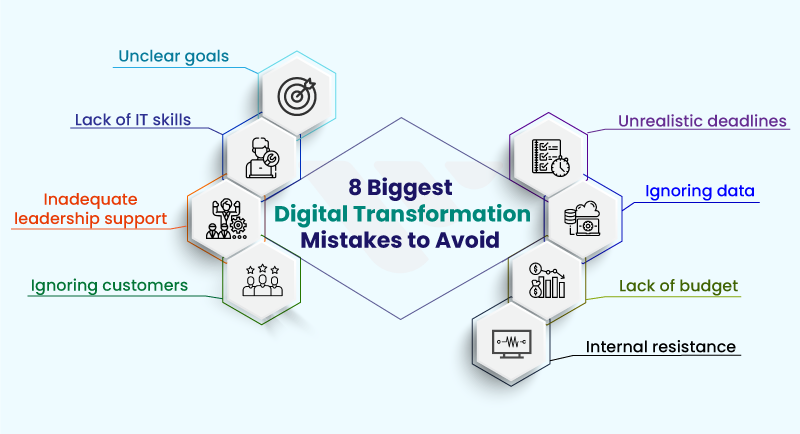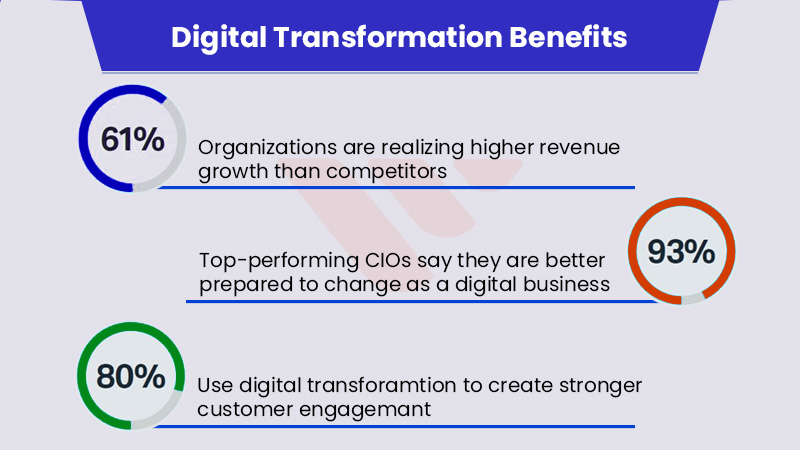
To stay relevant in today’s exponentially disrupting marketplace, businesses need to work faster and deliver more value. Digital transformation precisely promises that. It offers opportunities to companies across their business – from how they optimize their operations to how they engage with customers, employees, and other stakeholders.
Though digital transformation has become a necessity for many organizations, only a few achieve success.
In fact, a recent survey found that a staggering 84% of all digital transformation initiatives fail.
8 Biggest Digital Transformation Mistakes to Avoid
Here are the most common digital business transformation mistakes you need to avoid unlocking real digital value:

1) Unclear goals
Unclear goals and objectives are one of the main reasons why digital transformation fails. When the goal is not clearly defined, and KPIs are not agreed on, it is more likely that you will end up in failure.
Develop a clearly articulated, well-understood digital transformation strategy with specific, measurable, and achievable goals. It should start at the top and then spread across the organization. Ensure that every employee understands what they are doing, why it’s important, how it fits into business goals.
2) Lack of IT skills
Lack of IT skills or expertise can significantly hinder the digital transformation journey and jeopardize business with misaligned digital plans.
Businesses must acquire the right capabilities, tools, and talent for successful digital transformation. However, the skills required to facilitate transition probably will not be available in-house. Therefore, businesses must look out for digital transformation consulting providers to acquire a pool of talent required to fulfill their ambitious digital agenda.
3) Inadequate leadership support
Digital initiatives must be adopted throughout the organization – not just in some teams or departments. So, digital transformation requires full support from top management. If the leaders are not passionate, engaged, and committed to transformation, then the project is deemed to fail.
Top managers should have a strong vision and lead the way on a strategic level. Their full support and leadership should cascade down into the organization. They should be involved throughout the digital journey, inspiring and motivating employees for the change.
4) Ignoring customers
During digital transformation, many organizations quickly get carried away with innovative technologies and fail to consider that the customers are the crucial driver for the transition. These initiatives ultimately fail as they tend to focus on technology and do not consider the needs of real people – the customers.
Understanding how customer demands are evolving, especially during uncertain times like pandemic, is crucial for success. It is imperative to have customer-centricity and a customer-centric mindset. Organizations must always consider their customer’s end-to-end journey and include them in their digital transformation strategy.
5) Internal resistance
Digital transformation means breaking down traditional silos and reorganizing business towards a digital culture. But that won’t happen overnight, and the organization will resist your efforts to change.
The leadership team should be responsible for instilling a culture that accepts change. They should make clear why changes are required. Besides, there should be a clear picture of the target culture, which is on par with the business goals and objectives.
6) Lack of budget
As with other IT projects, most digital initiatives fail due to budget constraints. Most often, it isn’t the actual costs that lead to digital failure, it’s poor budgeting that can incur unexpected costs and cause allocated resources to drain prematurely.
As digital transformation is a continuous process and time consuming, preliminary planning and prioritizing is recommended to avoid bankruptcy. In the first place, you must understand that fixing a price tag on digital transformation won’t help.
7) Ignoring data
Businesses embracing digital transformation miss the huge opportunity for success when they fail to extract valuable insights from the data they’re collecting.
There is an ocean of data available. Exploit it, manage it, turn it into something you can actually use to drive your digital initiatives. Modern data management is one of the crucial steps you can take to win with digital.
8) Unrealistic deadlines
Defining concrete deadlines for the digital transformation initiative will never work for any business, as the transition is not a one-time setup. It is a continuous, slow process and may take months to years to enable true digital – considering how quickly technology is changing.
To keep your digital transformation on track, set interim goals rather than having a concrete deadline. As a result, you can better manage the deliverables and clearly understand the pace at which you are transitioning. This will also save your team from feeling overwhelmed with deadlines.
Also Read: Global Digital Business Transformation Market to Reach USD 1009.8 Billion
In Conclusion
In recent years, global businesses have shifted their digital transformation into high gear. But most of them are facing persistent barriers to success. However, asking the right questions upfront helps businesses guide their digital initiatives along the right path and avoid common pitfalls. As you plan to embark on your digital journey, ask yourself these questions:
a) What’s your approach? If it is only technology-centered rather than customer-centered, it’s not transformational.
b) Are we transforming the way we work? If it simply applies technologies to usual working processes, it’s not transformational.
c) What’s the scope? If the scope is just limited to a department or team rather than an organization, it’s not transformational
d) What are our goals? If it focuses solely on cost reduction rather than creating value, it’s not transformational.

Transform in a hyper-digital world, confidently – with Veritis
Veritis digital transformation strategy focuses on a human-centered approach, data insights, technology advancements, and new business models. Our digital experts help small, medium, and large companies, including Fortune 500 firms, successfully navigate the big transformational challenges every day. With over a decade long industry presence, we can help you start unlocking true digital value.
Let’s talk!
[WPSM_AC id=13897]
Digital Transformation Articles
- Business Transformation Vs. Digital Transformation: Differences!
- 6 Checklist Points That Promise ‘Digital Transformation Success’
- 16 Facts Showing ‘Upward Trend’ For Digital Transformation!
- 10 Factors That Make Perfect Digital Transformation (Infographic)
- What are the critical components of Digital Transformation?
- White Paper: Business Benefits of Digital Transformation
- Key Digital Transformation Trends ‘To Watch’ in 2020 and Further
